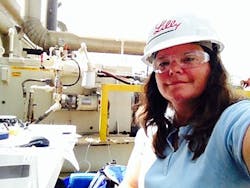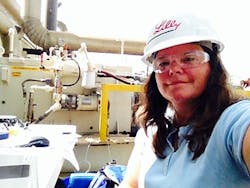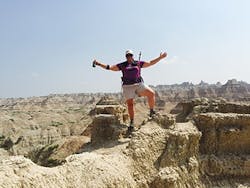Collaboration, Humility Keys To Manufacturing’s Future
Putman Media’s Influential Women in Manufacturing program launched this year. We received nearly 100 nominations for women with varying titles across many industries. As part of the coverage, Chemical Processing is profiling winners in the chemical industry to learn more about their trials and triumphs. In this installment we learn more about Rendela K. Wenzel, CMRP, CRL -- associate senior consultant engineer, Global Plant Engineering, Maintenance, and Reliability at Eli Lilly and Company.
Rendela K. Wenzel, CMRP, CRL -- associate senior consultant engineer, Global Plant Engineering, Maintenance, and Reliability at Eli Lilly and Company.
Why did you choose the career in engineering? And how did you land in manufacturing?
I think in a lot of ways it chose me. I wanted to be an engineer. I wanted to work with my hands and design and implement solutions. I started out in the Chrysler Corporation; they had their engineers start out on the floor, which I thought was a great opportunity. I learned a lot about people and about engineering, in general. And I learned about having to live with something that was designed and how the process works, so that was really good.
For me, positions never became available at the time I was ready to move into another direction. So I’d hop from one place to another. There was an opportunity at International Truck and Engine for a maintenance engineer, which I had no idea what that was. [When I asked, they said] "Well, we're going to change this maintenance engineer role into a reliability engineer role." I said, "Wow, what's that?"
So that is where I learned about predictive technologies. And that led into what I do today. I'm morphing into this global maintenance and reliability role. It's been a great ride.
Is it hard to get buy-in on predictive maintenance?
Being an operations and a maintenance manager I was challenged with do I run it or do I fix it? I also had to manage my own maintenance budget. That's not necessarily the case when you go to different areas. That really gave me an understanding of how you should run things. What is the overall design of something when you run it? What are its limitations? How long does it take to fix things? And then being able to take that knowledge and being able to communicate with upper levels of management. Going through some of the trials and tribulations in a role like that has really helped me to be able to communicate the need and wants of those in those roles.
What other challenges do you face in the field of reliability and maintenance?
I think that when you talk about reliability and maintenance, it's viewed as the same thing and it's really not. One is a short-term look; another one is the long-term look.
Also, I think communicating with senior management about lessons learned and completing the feedback loop in a role like a global maintenance and reliability leader is a challenge. Trying to take those shared learnings and trying to make sure that we don't bring those same pieces of equipment back in that don't necessarily function well within our process so we don't have to constantly relive the same issues.
Maintenance is still looked at as a cost center, not necessarily a profit center. So now when you go into predictive maintenance -- big data, IoT, smart maintenance, call it what you will -- they're very skeptical. But they know that this is the wave of the future.
The world is changing and we have to adapt to that as a pharmaceutical industry. So it's a matter of the culture change within the organizations to accept something like this and to see maintenance and reliability as a profit center and not as a cost center.
Eli Lilly's Rendela K. Wenzel has been to all the National Parks in the lower 48 United States. Her trail name is Last Minute.
Do you think that will happen or is it always going to be a challenge?
I think that the proof is in the pudding. What I'm trying to do now is bring in a lot of proof of concepts and working with different areas of the organization that historically we haven't worked with -- IT and the whole business architecture side of things.
I think that's part of the culture change; we've always been more siloed. I think we're becoming more circular, if you will, instead of siloed and I think that's great.
What has been your biggest triumph?
On the personal side, becoming a mother is one of my biggest triumphs. I have two kids and I never thought I’d be a mom. I've always been that wandering crazy soul.
Professionally, being the global maintenance and reliability leader for a major pharmaceutical company -- that's been really a great accomplishment for me. Designing and implementing predictive programs and changing the culture in organizations -- I've done that in two organizations now and I really like that. I like changing the whole dynamic of an organization to see this whole reliability and maintenance world is something different than what it's always seen as.
And the IoT thing is really going to be a major accomplishment for me. I'm really putting in a lot of blood, sweat and tears into this to try to make this a reality. I think pulling this off as a global project is something that I'll always treasure as an accomplishment.
In terms of reliability and maintenance, how is it different in other countries? Is the United States behind or ahead?
I think in terms of how it's viewed, maybe a little behind in the maintenance aspect in some ways. In Europe, I think they see it from the maintenance standpoint more as an equal. As far as the forward-thinking reliability focus culture, I think we're very far ahead. It’s just packaged a little differently as you go from country to country.
You served in the army. What was your rank? And do you feel that your military background has helped you with what you're doing now?
I think it has helped me to compartmentalize and be able to lead in a way that inspires people. You have leaders and then you have managers. Well, anybody can tell somebody what to do, but you have to be able to inspire the people who are underneath you. You have to be able to explain what it is that you're trying to do in a way that will make them want to follow you.
I started out as E1, the lowest level rank in the Army and worked my way up through being a company commander and as a captain. I’ve seen poor managers and leaders and I’ve seen some very, very good leaders. I wanted to pattern myself after those good leaders and try to have some of those attributes and utilize those in industry and it's served me very well.
It’s performance under pressure and I actually thrived on that and I think that's one thing that the army taught me is how to deal with that.
What are the biggest lessons or themes that emerge from mentoring?
In terms of mentoring, these kids come out with a very, very good skill set. They come out with attention to detail, but are still lacking in some areas. But I didn't have all the skill sets either. It's still that hands-on aspect that has to be learned. It's not something that can be taught in a book.
What I’m seeing is that they want to learn all different aspects of the business versus just one solid piece of it. How you mentor them and coach them is a little different. I like to take them through the crawl, walk, run. "Okay, here is this project. Here's the deliverables of the project. Figure out how you would go about doing something like this. And who are the people you might want to interface with?" and then helping them build a network connection within that.
What other advice would you offer young women and men entering the field?
You have to be open for any opportunities that present themselves. It may not be the most appealing role at the time. But the future outcome of what you're going to learn in the meantime waiting for that golden role to appear, that's the key. You always have to continue to learn and you have to stay humble.
You don't have all the answers so don't come out thinking that you do. Not everything is written in a book. And you need to let the people on the floor teach you things. And never think you're any better than anybody else because you're not. So that's one thing that I try to instill in the young people who are following me is, look, just stay humble and let those people teach you something because you will find out you learn a lot.
What question should I be asking that I haven't?
Where are we at in the industry as far as what the newest frontier? What's the next greatest thing? I think it's this IoT path. I'm seeing a lot of manufacturing coming back to the United States. And I think that's great because what we see especially in this company and other companies I've worked for is that we have to send our people to those sites to be able to educate and train. We have that expertise here in the United States and we need to continue to capitalize on that.
I think we're starting to collaborate with different countries, India, China, Japan and Europe. The tax breaks with those other countries aren't necessarily as good anymore. I think that IoT and helping the industry as a whole in the United States really continue to be even more competitive is the key. There are so many people getting on board now whether it's petrochemical, oil and gas, pharmaceutical, energy -- that's what I can see in the next horizon.
Tell me something that not many people know about you.
I've been to all of the national parks in the lower 48. And I love to hike all of the United States. I'm a big adventure junkie.
How how long did it take you to go to all of those parks?
Ten years.
What is your next goal?
I'd like to hike the Appalachian Trail. I've hiked 800 miles of it so far. I'd love to do the Triple Crown: the Pacific Coast Trail, the Continental Divide trail and the Appalachian Trail.
What is your trail name?
Last Minute -- that's how I plan stuff, last minute.
Quick Hits
What is your favorite band or genre of music?
I'm a country girl. I like Jason Aldean and Luke Bryan. But I also like pop, rock and old metal: Anthrax, Metallica, Black Sabbath.
What is your favorite movie?
I have a lot of them. I like National Treasure, Da Vinci Code, action-adventure type stuff like the Die Hard movies. I don't like scary movies. My kids laugh at me about that.
If you weren't a reliability engineer you'd be?
I'd be an adventure guide or a park ranger or probably an archaeologist in Egypt.
Would you use your trail name Last Minute and call it the Last Minute Tours?
Laughs


